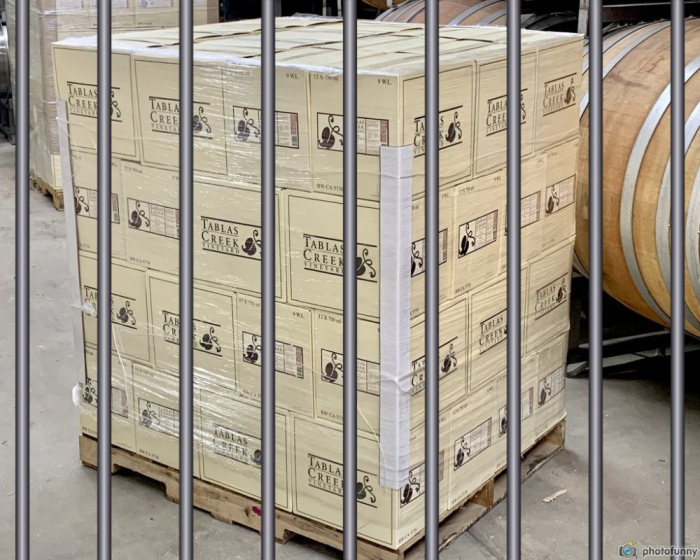No, 100% tariffs on European wines won't be good for California wineries
[Editor's Note July 21, 2020: These potential 100% tariffs, which would have crippled the wine wholesale infrastructure in the United States had they been established, were tabled for six months in January. Those six months are up, and they're back on the table. All my arguments from below are still at least as true as they were then, and the health of the wine wholesale ecosystem is shakier than it was then because so many restaurants are closed due to Covid-19. I strongly encourage all American wine lovers to contact your elected officials in Congress as well as the Office of the US Trade Representative. Comments need to be submitted by July 26th. You can do so from this link. And thank you.]
This morning, I submitted comments to the Office of the US Trade Representative, in opposition to the threatened 100% tariffs on European wines that could be imposed as soon as February of 2020. While I believe in an open market and am (like most of the people I know who work for domestic wineries) a lover of wines from around the world, it wasn't for that point. I am convinced that these tariffs would have severely disruptive effects on the whole system that has been legislated to provide a pathway between wine producers, like us, and the consumers who eventually want to buy the wines.

I'll share my comment, and then add some additional thoughts at the end of the blog.
I'm not sure that most consumers realize how little option wineries have to get their wines to markets around the country. In most cases, it is neither practical nor legal for us to sell to restaurants and retailers directly. So, we have relationships with distributors in each state. These distributors are licensed by their state to purchase wine from suppliers (domestic wineries like us, and importers of wines from other countries) and to then in turn sell those wines to restaurants and retailers. Restaurants and retailers are licensed to sell the wines to customers. While a string of court decisions and state law liberalizations have allowed us to ship wine directly to consumers in many states, nearly a third of what we sell to consumers for home consumption, and essentially 100% of what we sell to restaurants, passes through these various distributors.
Every one of the 50+ distributors who sells our wine also sells wine from countries around the world. Every one. There is no such thing, in my experience, as a domestic-only distributor. And for many of these distributors, a majority of their sales comes from European wines. These distributors would be devastated by tariffs that would slow that segment of their business to a trickle. Distributor salespeople, who are paid by commission, would see an immediate decline in their standard of living. Distributors would likely result by cutting sales staff and increasing the number of accounts each salesperson called on, reducing their ability to interface with accounts and sell the other wines in their portfolio.
But would there be a larger piece of the pie for California wineries? Not much of one, I don't think. At the low end, the likely substitute for European wines would be wines from other New World countries, like Chile, Argentina, and Australia, all of which do better in the under-$15 segment than American wineries. At the high end, there is really no substitute. An Oregon Pinot Noir isn't going to smoothly replace a Grand Cru Burgundy, nor is a California Nebbiolo going to replace a Barolo. High-end wines aren't commodities produced by formula from specific grapes, that could be grown anywhere. The places that they come from are inseparable from the wines' identities. My guess is that at the high end, there would be a period where restaurants and retailers scavenge inventory from warehouses around the country, and then sales would just decline as people wait and hope the tariffs are rescinded. In the middle? I'm not sure. There might be a few additional opportunities for wineries like us, but I doubt that these would amount to a net positive given the disruption in our distribution network.
What's more, I think there's every likelihood that European countries would retaliate with tariffs on American goods, including wines. While export markets aren't a huge piece of our business, they've been growing in recent years, and European countries like Germany, Denmark, Sweden, and France have been leading that growth. I would expect that piece of our market to disappear, as has our Chinese market since that particular trade war began a few years ago.
All of these economic costs are bad enough. The human costs would be worse. While our business would likely be OK, thousands of American jobs at restaurants and distributors would be at risk. The American consumer, who enjoys the world's most dynamic wine market, would see increased costs and decreased selection. And the cost to the European farmers and winemakers, many of whom have been farming their lands for centuries, would be heartbreaking.
What can you do? Submit a comment in opposition to the proposed tariffs:
- By January 6th: comment on the tariff related to France’s Digital Services Tax (specific to French goods)
- By January 13th: comment on the retaliation over Airbus subsidies
- Write your elected representatives; the NAWR put together form letters you can modify to your US Representative and US Senator.
Will it matter? There's no way to know. But the more voices they hear from, the better the chance.

